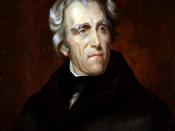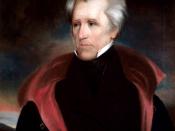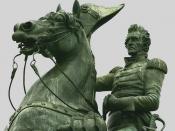Andrew Jackson was a man of action and a popular hero of his time. He was an expansionist who believed in government. These beliefs lead Jackson to encourage every American citizen to participate in government, by voting and speaking out to political bodies responsible for public welfare. He was regarded by many as a symbol of the democratic feelings of the time. Jackson had appeal for the farmer, for the artisan, and for the small-business owner; he was viewed with suspicion and fear by people of established position, who considered him a dangerous upstart.
Jacksonian Democracy in the strictest sense of the term is the type of politics that the Democratic Party adopted after Andrew Jackson's ascendancy in 1824. Jacksonian Democracy focused on strengthening the poor and lower classes of society, while attempting to lessen the weighty influence the well-to-do and wealthy had on America. This term also refers to the great reforms that coincided with Jackson's success, such as the expansion of voting rights and the reform of financial institutions.
Socially and intellectually, the Jacksonian movement represented not only the birth of a new class or sub-sect of democrats, but a diverse sometimes testy national coalition. Its origins reach back to the democratic ideals leading to the American Revolution.
The term Jacksonian government is a little misleading in terms of creative ownership. Jacksonian government was not the product of one mind alone, and thusly not purely Andrew Jackson's concept. This democracy type was evolving and changing up until the point of Andrew Jackson's election. The "Jackson" namesake refers more to the time frame of ideological development than to creative influence. Andrew Jackson was the first president to fully utilize the powers of the executive branch and establish it as an equal, if not superior branch of government. Henry Clay...


